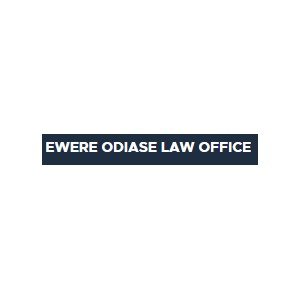Best Employer Lawyers in Asaba
Share your needs with us, get contacted by law firms.
Free. Takes 2 min.
List of the best lawyers in Asaba, Nigeria
Nigeria Employer Legal Articles
Browse our 1 legal article about Employer in Nigeria written by expert lawyers.
- Are Unwritten Employment Contracts Legally Valid and Enforceable in Nigeria?
- A contract of employment can exist whether orally or in writing. It can arise out of any discussion, obligation or instruction to do an act as far as the elements of a contract are present. Agreements are made to be honoured. An unwritten contract is enforceable provided it complies with... Read more →
About Employer Law in Asaba, Nigeria
Employer law in Asaba, Nigeria encompasses the regulations and rights that govern the relationship between employers and employees in the region. It covers various aspects such as employment contracts, termination, workplace safety, discrimination, and wages. Understanding the intricacies of employer law is crucial for both employers and employees to ensure fair and lawful practices in the workplace.
Why You May Need a Lawyer
Hiring a lawyer who specializes in employer law can be beneficial in various situations, including:
- Creating and reviewing employment contracts to ensure legal compliance and protect your rights as an employer or employee.
- Resolving disputes between employers and employees, such as wrongful termination, workplace harassment, or unpaid wages.
- Helping navigate complex labor laws and regulations to ensure compliance and avoid legal consequences.
- Providing guidance and representation during negotiations for collective bargaining agreements.
Local Laws Overview
It's important to be aware of the following key aspects of local laws relevant to employer law in Asaba, Nigeria:
- The Labour Act: This act governs employment relationships, including terms and conditions of employment, working hours, leave entitlements, and termination procedures.
- The National Industrial Court Act: This act establishes the National Industrial Court, which has jurisdiction over matters relating to employer-employee disputes, trade disputes, and other labor-related issues.
- The Discrimination (Employment and Occupation) (Amendment) Act: This act prohibits discrimination in employment based on factors such as gender, race, religion, or disability.
- The Employee Compensation Act: This act provides for the compensation and rehabilitation of employees who suffer injuries or death arising from accidents at work.
Frequently Asked Questions
1. Can an employer terminate an employee without a valid reason?
No, under the Nigerian Labour Act, an employer must have a valid reason, such as gross misconduct or redundancy, to terminate an employee. Wrongful termination can result in legal consequences for the employer.
2. What should I do if I have not been paid my wages?
If you have not received your wages, you can first try to resolve the issue amicably with your employer. If that fails, you can lodge a complaint with the National Industrial Court or seek legal advice from an employer law specialist.
3. How can I address workplace harassment or discrimination?
If you experience workplace harassment or discrimination, document the incidents and report them to your employer or the appropriate authority. If the issue remains unresolved, consulting an employer law attorney can help you understand your legal rights and options for recourse.
4. Are there any restrictions on working hours in Asaba, Nigeria?
Yes, according to the Labour Act, the maximum working hours for an adult employee should not exceed eight hours per day and 40 hours per week, excluding overtime. However, some exceptions may apply depending on the nature of the work.
5. Are employees entitled to paid leave?
Yes, employees are entitled to paid annual leave, which varies based on their length of service. The Labour Act mandates a minimum of six working days for employees who have completed the first year of continuous employment.
Additional Resources
For further information or assistance with employer law in Asaba, Nigeria, consider exploring the following resources:
- Asaba Chamber of Commerce, Industry, Mines, and Agriculture: They can provide guidance on local business practices and regulations related to employer law.
- Ministry of Labour and Employment: This governmental body can provide information on labor laws and relevant employment regulations.
Next Steps
If you require legal assistance or advice concerning employer law issues in Asaba, Nigeria, consider following these steps:
- Gather relevant documents and evidence related to your case.
- Research and identify reputable employer law attorneys in Asaba, Nigeria.
- Schedule consultations with potential lawyers to discuss your situation and evaluate their expertise and compatibility.
- Select a lawyer who best meets your needs and proceed with their guidance to address your employer law concerns.
Lawzana helps you find the best lawyers and law firms in Asaba through a curated and pre-screened list of qualified legal professionals. Our platform offers rankings and detailed profiles of attorneys and law firms, allowing you to compare based on practice areas, including Employer, experience, and client feedback.
Each profile includes a description of the firm's areas of practice, client reviews, team members and partners, year of establishment, spoken languages, office locations, contact information, social media presence, and any published articles or resources. Most firms on our platform speak English and are experienced in both local and international legal matters.
Get a quote from top-rated law firms in Asaba, Nigeria — quickly, securely, and without unnecessary hassle.
Disclaimer:
The information provided on this page is for general informational purposes only and does not constitute legal advice. While we strive to ensure the accuracy and relevance of the content, legal information may change over time, and interpretations of the law can vary. You should always consult with a qualified legal professional for advice specific to your situation.
We disclaim all liability for actions taken or not taken based on the content of this page. If you believe any information is incorrect or outdated, please contact us, and we will review and update it where appropriate.













